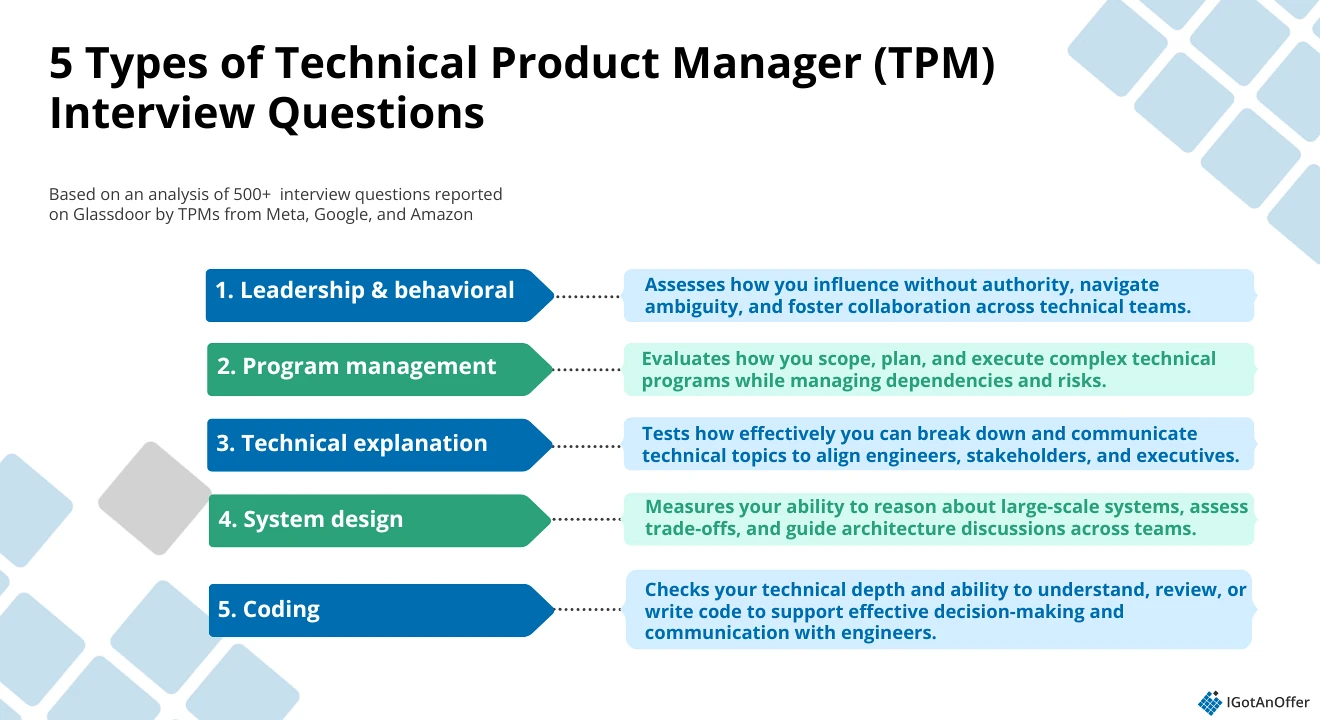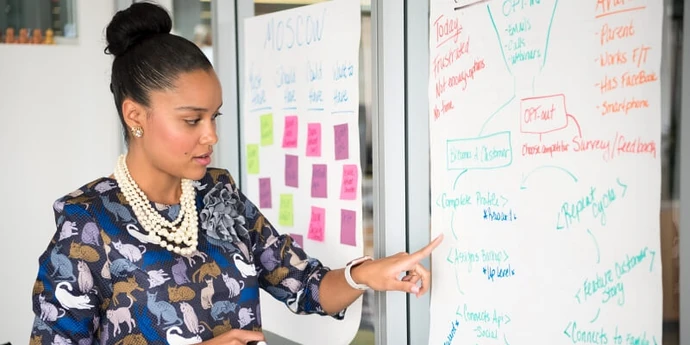Today, we’ll go over 50+ technical program manager (TPM) interview questions, including sample answers to the top 8 most commonly asked questions.
We made this list based on an analysis of over 500 real TPM interview questions collected from Amazon, Meta, and Google interview reports on Glassdoor.
In fact, once you’re prepared to answer the top 8 questions alone, you’ll already be prepared for nearly half of all questions reported.
Here’s an overview of everything we’ll cover in this interview guide:
- The 8 most important TPM interview questions
- 50+ more TPM interview questions (categorized)
- How to prepare for TPM interviews
Click here to practice 1-on-1 with TPM ex-interviewers.
1. The 8 most common TPM interview questions ↑
The questions you get asked in a TPM interview may vary depending on the exact role level and company you’re applying for. However, there are a handful of common recurring questions you should be prepared to answer, based on our research of 500+ questions reported by real TPM candidates on Glassdoor.
If you’re ready for these, you’ll be well on your way to acing your TPM interviews.
Here are 8 common questions you can expect to encounter:
1.1 “Explain X technical concept.”
Technical explanation questions like this test the depth of your technical knowledge and your ability to communicate that knowledge in a simple way.
Questions like “Explain how the internet works” made up nearly 15% of all the questions we studied, so it’s important that you know how to answer them.
Below is an abbreviated sample answer to this question to help you with your preparation.
We’ve organized it using our own 3-step answer framework. This helps structure your response, so your answers stay focused, logical, and easy to follow.
- Clarify. Narrow down the question’s scope and confirm what the interviewer wants to hear.
- Explain step-by-step. Walk through the concept methodically using plain language, concrete examples, or analogies to show both understanding and communication skills.
- Conclude and discuss. Summarize the main idea and invite further discussion, demonstrating that you can distill complex information and engage collaboratively.
This framework ensures that you communicate technical depth clearly and confidently.
Sample answer for “Explain how the internet works.”
-
Clarify: To reduce the scope of the explanation, you can start with something like:
“The internet is composed of many complex elements. I could talk about network connections, blockchain technology, specific web services, etc. But the most fundamental feature of the Internet is probably that websites can be accessed by typing a URL in a browser, so this is what I suggest we focus on. Does that sound okay to you?”
- Explain step by step: Take some time to write out your thoughts, then walk the interviewer through the steps. For example:
- The client browser uses the URL (e.g., example.com) to find the website’s IP address, which is either stored in local memory or found with a DNS lookup. Here’s a metaphor to help explain: a DNS resolver is like a big phone book matching URLs and IP addresses. If you wanted to call “John Smith” on the phone, first you would need to find his number in the phone book.
- Next, the browser uses the IP address and queries the Internet for the website’s data. This is like if you dialed John Smith’s number, then the phone company would make a connection between your phone lines.
- Then the website’s server sends appropriate data (e.g., an index.html file) back across the Internet. To continue the metaphor, when John Smith answers and says hello, his voice is translated into an electronic signal that’s passed through the phone lines.
- Finally, the website’s data reaches the browser, which then displays a visual interpretation of that data. This is like your phone’s speaker turning the electronic signal into John Smith’s voice again.
- Conclude and discuss: After going over the above, you could conclude by saying:
“So, typing a URL into the address bar of a browser works a lot like making a phone call. Information is transferred back and forth between two connection points, and the transferred information needs to be interpreted by the receiver.”
For the full version of the answer above and an explanation of the framework, check out our guide to technical interview questions. While this guide targets primarily product managers, the answer framework for technical explanation questions can be used for TPMs as well.
1.2 “Tell me about X project or program you’ve managed.”
This classic behavioral question targets your past experiences in program management. This question, and others like it, made up nearly 11% of the 500+ questions we collected.
Here, interviewers are trying to get an idea of your working style and the impact you’ve made in past positions.
Below is a high-level example of how a candidate could answer this question, using IGotAnOffer’s signature SPSIL framework (Situation, Problem, Solution, Impact, Lessons) for answering behavioral questions.
Sample answer for “Tell me about a past project you’ve managed.”
- Situation:
“In my past position, I was the lead TPM working on a new feature for a ride-share app, with which users would be able to share the profile and license plate number of their driver, as well as their live location, with a friend for safety."
- Problem:
"This was a key feature, as we had begun to receive reports of some users feeling unsafe using the app. We needed to act fast, both to make sure our users were safe and to get ahead of any PR issues."
- Solution:
"Our goal was to roll out the feature in a month and a half. We had never developed a feature that quickly before. So I put together four teams (IOS, Android, back-end, and editorial/design) and briefed them on the urgency.
I implemented an agile methodology to move things along, encouraging the engineering teams to shorten their development cycles, from 2-week sprints down to 1-week sprints, continuously checking in and giving feedback.
I also aimed to motivate the teams by constantly passing along the user reports we were receiving, appealing to their concern for and attention to the customer to encourage their best and fastest work."
- Impact:
"We ended up rolling out the feature in 45 working days. Our customer complaints went down by 20%, and the feature was actually lauded in a popular tech magazine as an important step toward rideshare safety. After the article, our signups went up by about 15% month over month."
- Lessons:
"This experience really cemented for me that just because something hasn’t been done before at a company (like a 1.5-month release), that doesn’t mean it’s not possible. It also helped me understand Agile and implement it better in the future."
For a full framework to use when answering behavioral interview questions and sample answers using the framework, consult our guide to behavioral interview questions.
1.3 “Design X system.”
System design questions like “Design X app” are a key part of TPM interviews, as interviewers need to know if you are capable of discussing architecture concepts in a clear and structured way.
Because system design answers are complex and typically develop over an entire 30-45 minute interview round, we opted not to give you an abbreviated answer for this example.
Instead, we’ve listed points of consideration to keep in mind when designing this system, divided into a framework you can use to answer any system design question.
This framework helps you structure system design discussions clearly and logically. It moves from problem definition to a scalable solution. It can help you demonstrate your strategic thinking and strong communication, which are key traits interviewers look for when assessing a TPM’s ability to lead technical conversations and align teams around design decisions.
Sample answer outline for “Design a social media app.”
- Ask clarifying questions.
- Is the interviewer looking for a design of the core features, or a high-level overview of the whole service?
- What are the constraints of the system?
- What are your assumptions? (Traffic distribution, number of active users and tweets, read vs. write-heavy)
- Design high-level.
- Back-of-the-envelope calculations: Average KBs per tweet, size of new tweet content per month, read requests and tweets per second, etc.
- High-level components: Write, read, and search APIs; types of databases; SQL vs NoSQL; etc.
- Drill down on your design.
- Potential bottlenecks: Adding a load balancer with multiple web servers, scalability issues, fanout service slowing down tweets and replies, etc.
- Components that you could dive into: How a user views the home timeline or posts a tweet, the intricacies of the database design, etc.
- Bring it all together.
- Consider this: Does the final design address the bottlenecks you’ve identified? Does it meet the goals you discussed at the beginning of the interview? Do you have any questions for the interviewer?
To learn more about what framework we’re using above and a complete system design interview answer, check out our guide to answering system design interviews.
1.4 “Tell me about a conflict or challenge you’ve faced.”
Managing projects and programs requires working with diverse groups of stakeholders. Interviewers want to be sure you’re capable.
Revealing behavioral interview questions, such as “Tell me about a time you handled conflict” and others like it, are used to test your interpersonal skills and ability to work in cross-functional teams.
Below is a shortened sample answer to this question, using the SPSIL framework we mentioned above.
Sample answer to “Tell me about a past conflict you faced.”
- Situation
"In my past job, I was on a product team composed of coworkers from various functional areas of our company. I frequently jumped in with ideas and volunteered to lend a hand in many tasks."
- Problem
"I noticed that one of my coworkers was cutting me off when I presented ideas. When I volunteered to help with a task in his functional area, he neglected to give me the information and resources I needed in order to contribute. This behavior continued, causing a conflict that slowed down our progress on important tasks."
- Solution
"I met with my coworker. I politely expressed how his behavior was affecting work and asked if I had overstepped boundaries. He explained that my initial eagerness had taken up too much time in the meetings, giving him and others less of an opportunity to contribute. When I helped in his functional area, it slowed him down to have to explain the processes to me.
I then presented a plan to avoid further conflict: I would be more attentive to the time I spent speaking in meetings and would only volunteer for tasks when I was confident I was well-equipped to contribute. In exchange, I requested that he approach me in case further issues arise, instead of closing me off from discussions or projects."
- Impact / Lessons
"We each adjusted our behavior and avoided further conflict. We were able to catch up on the delays we were beginning to incur with our communication issues, finishing the project on time and meeting our initial goals."
For more in-depth guidance on this question, consult our guide on 5 ways to answer "Tell me about a time you handled conflict at work."
1.5 “Tell me about a time you failed.”
In TPM interviews, interviewers aren’t looking for perfection. They’re looking for honesty, self-awareness, and evidence that you can turn setbacks into learning opportunities.
Behavioral questions like this test your ability to take accountability, reflect on mistakes, and demonstrate growth.
When preparing a story example, try to choose a situation where something meaningful went wrong, but where you ultimately identified the root cause and improved your approach.
For example, you might describe a situation where a project missed a launch deadline due to underestimated dependencies. You could then explain how you handled communication with stakeholders, conducted a postmortem, and implemented new risk assessment steps in future planning.
A strong answer to the question “Tell me about a time you failed” includes:
- Brief context of the project or situation
- What went wrong and why
- What you did to fix or mitigate it
- What you learned and how you’ve applied that lesson since
Ultimately, this question is about maturity and growth. You want to show that you don’t hide from failure, but use it to become a better leader and collaborator as a TPM.
For more in-depth guidance on this question, consult our guide on 5 ways to answer "Tell me about a time you failed."
1.6 “Describe the technical architecture of a project/app/product you worked on.”
This question evaluates both your technical depth and your ability to communicate complex systems clearly.
TPMs are expected to understand architecture at a high level: how components fit together, where tradeoffs exist, and how design decisions align with business goals.
You don’t need to dive into code-level detail for this, but you do need to show that you have a great grasp of technical concepts and language and can make sound technical judgments.
When approaching this question, focus on clarity, relevance, and structure. Aim to walk the interviewer through the system in a way that’s easy to follow.
Here’s one way you can approach this question effectively:
Points of consideration for “Describe the technical architecture of a project you worked on.”
1. Choose the right example.
Pick a project that’s both technically interesting and easy to explain in a few minutes, ideally something that demonstrates scale, integration complexity, or critical decision-making.
Avoid overly niche systems unless you can connect them to familiar concepts.
2. Set the context.
You can keep this part brief. Start with a quick overview of:
- What the system does and who it serves
- The problem it was designed to solve
- Your specific role in designing, reviewing, or managing the architecture
This ensures the interviewer understands why the architecture matters before you dive into how it works.
3. Describe the architecture clearly.
Walk through the main components and how they interact, using simple, logical sequencing. For example, explain:
- How data flows through the system
- Which services handle which responsibilities
- What technologies or frameworks were used, and why
- Highlight tradeoffs you considered and justify your decisions.
4. Summarize the results.
End by connecting the architecture to its measurable impact: improved performance, easier maintenance, reduced costs, or faster feature delivery. This ties technical design back to business value.
You can also summarize key design choices and their tradeoffs. For example, why you chose a certain database type, communication protocol, or cloud architecture, and how those decisions helped the system meet its requirements.
A concise way to close could be something like:
“So, at a high level, that’s how the system was structured. The main design choices were driven by scalability and reliability needs, and this setup allowed us to achieve both without overcomplicating the architecture.”
That kind of ending wraps up the explanation naturally and reinforces your understanding of architectural reasoning.
Depending on the interviewer’s follow-up questions, you may or may not have the chance to discuss your leadership impact on the architecture you’re describing. But keep in mind, the main goal is to show your technical understanding and ability to communicate it clearly.
For more guidance on this type of question, check out our guide on how to crack product architecture interviews. Though this article focuses on Meta’s interviews, it’s applicable to any company that covers similar interview questions.
1.7 “How would you measure the success of a project?”
TPMs are expected to bridge the gap between delivery and outcome. This means you need to show that you understand not only how to complete a project, but also how to select the right metrics to measure and determine if the project/program truly created value.
This question tests whether you think about success in terms of impact, rather than just execution.
When answering, make it clear that your approach to measuring success starts at the planning phase and continues beyond delivery. Here’s how you can structure your thinking:
Considerations when answering the question “How would you measure the success of a project?”
- Clarify project goals
Before defining any metrics, you need to understand what the project is trying to achieve. Is the goal to improve system reliability, increase feature adoption, or streamline internal processes? Start your answer by saying that you would work with stakeholders to define these objectives early.
This shows you align technical work with broader business outcomes.
It also demonstrates that you avoid retrofitting metrics after launch, which is a common mistake.
- Select relevant metrics
Once the goals are clear, identify quantifiable indicators that accurately reflect progress toward them. For technical projects, these could include system uptime, incident frequency, mean time to recovery (MTTR), or deployment success rate.
For user-facing projects, metrics like adoption rate, engagement, retention, or satisfaction (e.g., CSAT or NPS) make more sense.
You can also mention qualitative inputs, such as user feedback or internal stakeholder satisfaction, to show a balanced perspective.
- Establish metrics early
Emphasize that success criteria should be defined before execution begins. This ensures that teams share a common understanding of what success looks like and can build tracking mechanisms (like dashboards or reports) into the workflow from the start.
- Track and evaluate
Describe how you would monitor these metrics throughout the project’s lifecycle and evaluate them after launch.
During development: Use metrics to catch early signals that indicate whether the project is on track.
After release: Assess whether the outcomes matched expectations and document lessons learned for future programs.
You can wrap up your answer with a statement like: “I define project success based on measurable outcomes that tie back to the original goals — not just whether we launched on time, but whether the project drove meaningful improvement for the business and its users.”
1.8 “Why do you want to work at this company?”
A classic used in pre-onsite screening rounds and as an icebreaker in final interview rounds, this question tests how well you did your research about the company you’re interviewing for.
Interviewers ask “Why our company?” to test whether you’ve got the motivation to last in their kind of environment. If your interviewer senses that you are not motivated enough, or that you’re motivated for the wrong reasons (i.e., just a paycheck), then they will be unlikely to push your application further.
Interviewers also want to get an idea of how well you’ve researched and prepared for the interview. For example, if you’re applying for a highly data-based company like Amazon, they’re looking for employees who know how to put in the work and make major decisions based on analysis.
Coming to the interview with well-researched and specific reasons as to why you want to work for your target company shows them that you’re the profile they’re looking for.
What does a great answer to this question sound like? Here are a few best practices:
Components of a great answer to “Why do you want to work at this company?”
Let's assume you're interviewing for a TPM role at Amazon:
- Network: Make an effort to meet with or call one or more current employees, ideally from the team you’re applying to. Ask them what it’s like working there, why they chose Amazon, and what is unique about it. This will give you good, specific talking points for your answer, and mentioning their names shows the interviewer that you’ve put in effort to get to know the company.
- Make it personal: If you have any examples from your personal experience that tie in with Amazon, now is a good time to bring them up: an Amazon product that shaped how you see the world, an Amazon initiative that has made a difference in your life, etc.
- Make it specific: Your answer for “Why Amazon?” should not apply to any other company. Try swapping out “Amazon” with other big tech names like Google and Meta. If the answer also works for other companies, that’s a sign that you need to keep polishing your answer.
- Give more than one reason: Aim for two to three concise reasons as to why you want to work for Amazon, as well as in your team and position specifically. Adding any more reasons risks making your answer too long, and only having one reason likely won’t be a strong enough answer.
- Talk about your team: Amazon is an enormous company, which means that some of the reasons why you might want to work for Amazon as a whole may not be specific enough. So talk about the team and role that you’re applying for, and why that is a perfect fit for you as well.
- Keep it balanced: While you want to answer this question enthusiastically, overly praising Amazon or yourself will come off as disingenuous. Give real reasons as to why you want to work there, without offering empty compliments.
Below, we crafted a brief sample answer to this question. Note how it takes less than one minute to recite, and it aligns the candidate’s experience with Amazon’s company culture.
Sample answer for “Why do you want to work at Amazon?”
"I want to work at Amazon for three reasons.
First, I admire Amazon’s customer obsession leadership principle. This is something I've experienced first-hand when dealing with Amazon’s customer support, and it's also a principle I've been pushing at my current company. I was able to spearhead an initiative to update our support ticket system based on customer feedback, which decreased complaints by 20%.
Second, I greatly admire the Amazon Video product and its positioning in the market. I’d be excited to bring my experience to the Amazon Video team, as I've spent the last five years of my career in the streaming space, producing videos on my own as a hobby and working for a content production startup.
Third, I’m drawn to Amazon’s scale and culture of innovation. The opportunity to work on products that reach millions of customers worldwide—while constantly experimenting and iterating—really motivates me. I want to be in an environment where big ideas are encouraged and executed quickly, and Amazon embodies that mindset."
For instructions on crafting your own perfect answer, follow the steps in our guides to the "why do you want to work here" interview question at Amazon, Meta, and Google.
2. 50+ more TPM interview questions (categorized) ↑
Now that we’ve gone through the eight most common technical program manager interview questions, let’s get into a longer list of questions that have been asked in real TPM interviews, according to data from Glassdoor.
We’ve separated the questions into five categories:

Let’s take a look at each question category in more detail.
2.1 Leadership & behavioral questions ↑
Technical program managers work in cross-functional teams and are the glue between product, design, engineering, and QA. They need to be able to communicate clearly and demonstrate a track record of delivering projects flawlessly.
This is the part of the interview process where you want to show that you’re good at working with others and can anticipate potential issues before they arise.
Be prepared to talk about situations where you've troubleshot program bottlenecks, negotiated design components with engineers, adapted your program when requirements changed, etc.
Below are common example questions that you can expect in this type of interview, according to data from Glassdoor.
Example leadership & behavioral questions asked in technical program manager (TPM) interviews
Leadership
- What’s your past experience, and how is it relevant to the position? (Meta)
- Describe some attributes of a high-functioning team? (Google)
- Tell me about a situation where you demonstrated your leadership skills. (Google)
- What experience do you have in reporting to high-level management? (Amazon)
- Did you have the chance to read the principles of the company? What drove you toward us, and why this specific role? (Amazon)
Behavioral
- Tell me about yourself.
- Tell me about a time you failed. (Meta / Amazon)
- How do you handle ambiguity? (Google)
- How do you prioritize projects? (Google)
- Tell me about a time when you took a risk. (Amazon)
- Tell me about a time when you worked cross-functionally. (Google)
- Tell me about a time when you worked with a difficult team member. (Meta)
- Tell me about a time when you had to overcome doubts from your boss or management on a program. (Google)
- Tell me about a time when you had to compromise/balance your personal growth to make a project work and benefit your team. (Google)
- Tell me about a time when you did something without your manager's approval. What was the situation? (Meta)
- Imagine you work on a team with an individual or in a negative culture. How would you address the issues with this individual or team? (Google)
- Tell me about a time when you had to describe something that an audience had never heard before. How did you explain it to them and make an impact? (Google)
- Tell me a time when you solved a complex problem when you didn't know anything. (Amazon)
- Describe a time when you had to complete a project without any direction or a defined scope. (Amazon)
- Speed is critical in Amazon. Tell me about a time when you did something that required speed. (Amazon)
Learn more about how to answer common behavioral interview questions and leadership questions.
2.2 Program/project management questions ↑
TPMs design and execute programs from end-to-end. It's therefore important that they have a strong ability to plan, prioritize, and deliver projects.
This is the part of the interview process where you need to show you think about programs in a comprehensive way (e.g., resources, risks, stakeholders, schedule, cost, etc.) and have a track record of executing flawlessly.
We've listed typical program management questions you can expect below and organized them into seven categories to make your preparation easier. Notice that the majority of the questions in the list are hypothetical (“How would you…”), rather than behavioral (“Tell me about a time when…”).
That means that for this type of question, you’ll want to talk about future actions and how you might approach an imaginary scenario (e.g., “I would do X, Y, and Z.”) instead of talking about past experiences, as you would for behavioral questions.
Example program/project management questions asked in TPM interviews
General
- What is a project charter? (Google)
- What is SOW? (Google)
- What is a mature process? (Meta)
- What is an optimal project/program kickoff? (Google)
- Walk me through the complete program lifecycle. (Google)
- Tell me out loud how you would create something new from scratch. End-to-end. (Google)
- Talk about a strategy you created for a program/product. (Meta)
- Explain how you would assess a new Google site. (Google)
Prioritization
- How do you prioritize projects? (Google)
- If you were given several tasks with varying due dates and limited information, how would you go about scheduling them? (Google)
Planning & development
- What security considerations would you put in place when building an application? (Amazon)
- How many times would you have design reviews during project development? (Google)
- How would you plan for the migration of servers? (Google)
- How would you plan the migration of data centers on critical dates with heavy loads? Discuss volumes, mitigations, redundancies, etc. (Google)
- If you were to launch a street view app with 1,000 camera-fitted cars, how would you go about launching it? What risks, resources, and budget are required? (Google)
Risk management
Delivery
Dive deeper into program management questions with our program management primer for tech interviews.
2.3 Technical explanation questions ↑
As a TPM, you often act as the bridge between engineering and non-technical teams, so interviewers want to see that you can explain how systems, tools, or technical processes work. Technical explanation questions test your ability to break down and communicate complex concepts to different audiences.
In this part of the interview, clarity matters as much as accuracy. These questions typically start with prompts like “Explain X” or “How does Y work?” The goal is to show that you can make technical topics understandable, structured, and relevant. Your answers should be focused and easy to follow.
We’ve listed common technical explanation questions below to help you prepare.
Example technical explanation questions asked in TPM interviews
- Explain hashing algorithms for encryption. (Google)
- How does search prediction work? (Amazon)
- Explain the Web services part for a PVR movie ticketing platform. (Amazon)
- Explain how you would perform load balancing among web servers without using a centralized server to allocate resources to the other servers. (Amazon)
- How would you improve the accuracy of GPS data? (Meta)
- What’s the difference between TCP and UDP? (Meta)
- Explain the concept of IRU (indefeasible rights of use). (Google)
- What is Young's modulus? (Google)
2.4 System design questions ↑
As a TPM, you need to be able to engage in system design discussions with engineers and to discuss the merits of architecture A vs. architecture B. System design interviews assess whether you have thorough technical knowledge and can discuss architecture concepts in a clear and structured way.
These questions usually probe into the design of a system you've previously worked on or ask how you would design a new system from scratch.
Here are some example questions you can practice with:
Example system design questions asked in TPM interviews
- Design a system, given X requirements. (Meta)
- Design a generic onboarding platform. (Amazon)
- Design a travel app? (Meta)
- Design a polling system for students spread across 30 colleges across the globe. (Meta)
- Design an app that promotes vaccination against COVID-19 in your country. (Meta)
- Design a key pair system that can handle 3,000 keys per second. (Google)
- How would you develop the backend of a parking app? (Amazon)
- How would you design Twitter now, if you had never used it? (Amazon)
- How would you design a live streaming service that can serve large traffic when a celebrity or popular user streams? (Meta)
- How would you design a system to regulate foreign advertisements and ensure they do not influence domestic political processes? (Meta)
For more information on how to prep for system design interviews, check out our guides to general system design and machine-learning system design interviews.
2.4 Coding questions ↑
Finally, coding questions are rare but still sometimes mentioned in interview reports.
For TPM interviews, the coding questions asked are much easier than the typical LeetCode questions you can expect in software engineering interviews at Meta, Amazon, or Google.
Instead of advanced algorithmic problems involving dynamic programming or complex data structures, TPM coding questions usually focus on fundamentals. The emphasis is on demonstrating logical thinking and understanding how code works, rather than producing an optimized or production-ready solution.
If you're currently an engineer, then you'll probably be asked to write working code. Otherwise, you can likely get away with pseudocode.
Here are some coding-related questions your interviewer may ask to test your coding knowledge.
Example coding questions asked in TPM interviews
- What is the lookup time for a linked list? (Amazon)
- Explain hashing algorithms for encryption. (Google)
- How would you code a reverse string if no built-in functions can be used? (Google)
- Write a program to find if an integer is a palindrome. (Google)
- Write a program to find common items between two linked lists. (Amazon)
- Write a program that traverses a linked list. (Amazon)
- Write a program to identify all the equal elements between two arrays. (Amazon)
Learn more with our coding interview prep guide and guide to answering coding interview questions.
3. How to prepare for technical program manager interviews ↑
Now that you know what questions to expect, let's focus on how to prepare. Here are the three most important things you can do to prepare for your technical program manager interviews.
3.1 Learn about your target company’s culture
Most candidates fail to do this. But before you invest dozens of hours preparing for an interview at your target company, take some time to make sure it's actually the right company for you.
If the company is prestigious, such as FAANG and other top tech companies, it's tempting to assume that you should apply without considering things more carefully.
But it's important to remember that the prestige of a job (by itself) won't make you happy in your day-to-day work—it's the type of work and the people you work with that will.
If you know TPMs or engineers who work at your target company or have worked there, talk to them to understand what the culture is like. Do your research on your target company’s core values and internal culture.
3.2 Practice by yourself
As mentioned above, you'll have to answer four types of questions in your TPM interviews: leadership & behavioral, program management, system design, and coding.
The first step of your preparation should be to brush up on these different types of questions and to practice answering them by yourself.
Here are our recommendations on how to best prepare for each interview type.
3.2.1 Leadership and behavioral questions prep
For behavioral interviews, we recommend consulting our leadership and people management primers, as well as learning our step-by-step behavioral interview method.
Create a bank of 10+ personal stories where you've shown you can lead and collaborate with a cross-functional team. You'll find this method in our Facebook behavioral guide, but it applies to any company.
Once you've got a bank of stories, you can practice using them to answer the behavioral questions we've listed above. You should emphasize different aspects of your story, depending on the exact question asked.
3.1.2 Program management questions prep
For program management questions, we recommend starting by brushing up on the basics with our program management primer. Another efficient way to do this is to take a free course designed to prepare for the Project Management Professional (PMP) exam, such as this course on LinkedIn Learning.
This will allow you to refresh your memory on all key aspects of project management, including: scope, schedule, resources, cost, quality, communication, risk, stakeholders, etc.
In addition, if you're interviewing for a TPM role in software development, you should make sure you're on top of common concepts used in Agile project management.
A great resource here is Atlassian's Agile project management guide. In particular, we recommend brushing up on the difference between Kanban and Scrum, and the common structures used in Agile projects (e.g., epics, stories, themes, etc.).
Similarly, if you're applying for a hardware TPM role, then you'll want to brush up on the different engineering validation stages (EVT, DVT, PVT).
Prepping for a TPM interview at a specific company? You might want to check out these guides:
3.1.3 System design questions preparation
For system design questions, we recommend getting used to the step-by-step approach hinted at by Amazon in this video.
Here is a summary of the approach:
- Step 1: Ask clarification questions
- Understand the goal of the system (e.g., sell ebooks)
- Establish the scope of the exercise (e.g., end-to-end experience, or just API?)
- Gather scale and performance requirements (e.g., 500 transactions per second)
- Mention any assumptions you're making out loud
- Step 2: Design at a high level
- Specify one or two metrics
- Lay out the high-level components (e.g., front-end, web servers, database)
- Step 3: Drill down on your design
- Drill down and design each component (e.g., front-end first)
- Start with the components you're most comfortable with (e.g,. front-end if you're a front-end engineer)
- Work with your interviewer to provide the right level of detail
- Step 4: Bring it all together
- Refer back to the requirements to make sure your approach meets them
- Discuss any tradeoffs in the decisions you've made
- Summarize how the system would work end-to-end
We'd also recommend studying our system design interview prep guide, which digs into this method in more detail. It also provides several example questions with solutions.
3.1.2 Coding questions preparation
Technical program managers (TPMs) don’t need to code daily, but they should be comfortable discussing algorithms and basic coding logic. Interview prep guides note that TPMs are often tested on fundamentals like arrays, hash maps, and recursion to assess “technical eligibility”.
Reviewing these topics through short, consistent practice sessions on sites like LeetCode can help you build confidence and fluency.
Keep in mind that as a TPM, you won’t be expected to be as technical as, say, a software engineer. However, you will be expected to know your way around relevant coding concepts and may need to provide at least pseudo-code. When practicing, focus on communicating how you’d approach a coding problem, rather than getting caught up in the actual coding itself.
We recommend learning the step-by-step method we've developed. To practice, you can use that method to craft answers to the technical questions listed in the previous section.
You may also want to check out some of our coding interview guides:
General coding/code review interview guides
- How to get better at coding interviews (tips from FAANG interviewers)
- How to answer coding interview questions
- How to prepare for coding interviews
- How to crack the Google code review interview
Company-specific
Once you’re in command of the relevant subject matters, you’ll want to practice answering interview questions. But by yourself, you can’t simulate thinking on your feet or the pressure of performing in front of a stranger. Plus, there are no unexpected follow-up questions and no feedback.
That’s why many candidates try to practice with friends or peers.
3.2 Practice with peers
If you have friends or peers who can do mock interviews with you, that's an option worth trying. It’s free, but be warned, you may come up against the following problems:
- It’s hard to know if the feedback you get is accurate.
- They’re unlikely to have insider knowledge of interviews at your target company.
- On peer platforms, people often waste your time by not showing up.
For those reasons, many candidates skip peer mock interviews and go straight to mock interviews with an expert.
3.3 Practice with experienced technical program manager interviewers
In our experience, practicing real interviews with experts who can give you personalized feedback and company-specific insights makes a huge difference.
Find a TPM interview coach, so you can:
- Test yourself under real interview conditions
- Get accurate feedback from a real expert
- Build your confidence
- Get company-specific insights
- Learn how to tell the right stories, better
- Save time by focusing your preparation
Landing a job at a big tech company often results in a $50,000 per year or more increase in total compensation. In our experience, three or four coaching sessions worth ~$500 will make a significant difference in your ability to land the job. That’s an ROI of 100x!
Click here to book mock interview sessions with expert TPM interview coaches.















